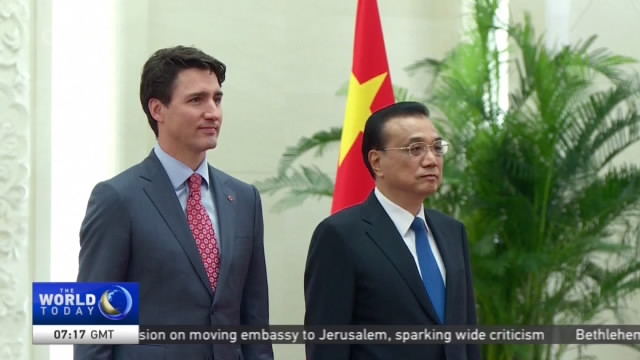
15:58, 06-Dec-2017
Canadian PM in China: Both countries looking to thrash out a formal trade agreement

This is the Canadian prime minister's second visit to China since he took office in 2015. He earlier announced that this time around he would try to focus on building stronger bilateral trade relations that would encourage the countries to do more business with each other. CGTN's Grace Shao talked to the Canada China Business Council to find out more about the benefits of a formal trade agreement.
The Canadian Prime Minister Justin Trudeau said he's looking to bring Beijing and Ottawa ever closer amid the uncertainty surrounding the renegotiations of the North American Free Trade Agreement. And at a meeting with his Chinese counterpart, Li Keqiang, they both expressed an interest in pursuing stronger trade relations, and opening talks on a future trade agreement.
GRACE SHAO BEIJING "Last year, six percent of Canada's exports went to China. And with their bilateral trade at 66.4 billion US dollars, China is Canada's second largest trading partner behind the US."
As the sides look to boost their trade relations, a comprehensive agreement would, of course, bring about many enticing economic benefits for both, such as lower tarriffs on imported goods.
SARAH KUTULAKOS EXECUTIVE DIRECTOR, CANADA-CHINA BUSINESS COUNCIL "From the perspective of the Canadian business community, we want more stable and secure access the Chinese market and act as a resolution for some of the regulatory challenges Canadian companies that exist."
According to a survey released by the CCBC, most Canadian operations in China are performing well, but they're facing increasing competition, rising costs and, at times, ambuiguous regulations. They believe a definitive trade agreement between the two countries could remove many of these concerns.
SARAH KUTULAKOS EXECUTIVE DIRECTOR, CANADA-CHINA BUSINESS COUNCIL "We're in favor of this kind of negotiation even if an FTA isn't what I personally need, even if there is nothing for my company in it. Whatever the negotiation happens, we'll be good."
Canada is well renowned for its natural resources and commodities especially its national crop, Canola. In fact Canada accounts for about three-quarters of all the international Canola trade. And China is a huge market in this regard. Canada exports about 2.7 billion Canadian dollars worth of Canola to China annually where it's then processed into cooking oil. Jim Everson of the Canadian Canola Council believes a trade agreement would benefit both Canadian farmers and Chinese consumers.
JIM EVERSON, PRESIDENT CANOLA COUNCIL OF CANADA "We think it's very important to have a stable business environment for trade. It will benefit the Canadian farmers and Chinese consumers."
With Canada trying to diversify its trade exports, and China's market demands growing every day, experts believe any formal trade agreement between the two nations would be greatly welcomed. Grace Shao, CGTN, Beijing.

SITEMAP
Copyright © 2018 CGTN. Beijing ICP prepared NO.16065310-3
Copyright © 2018 CGTN. Beijing ICP prepared NO.16065310-3